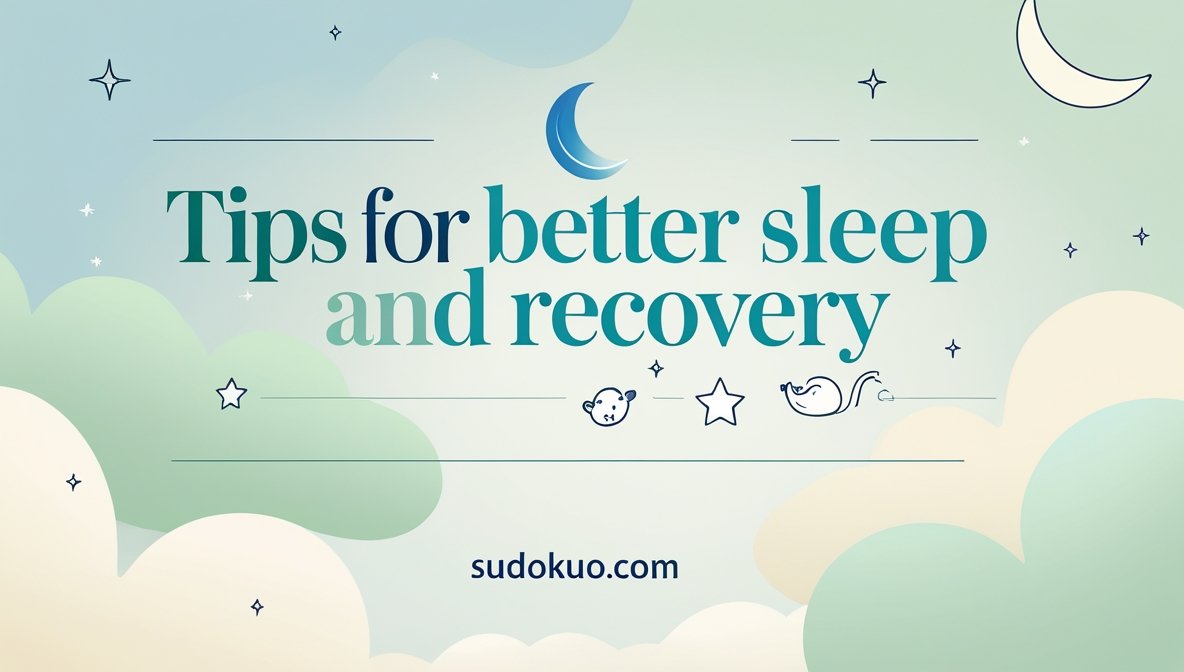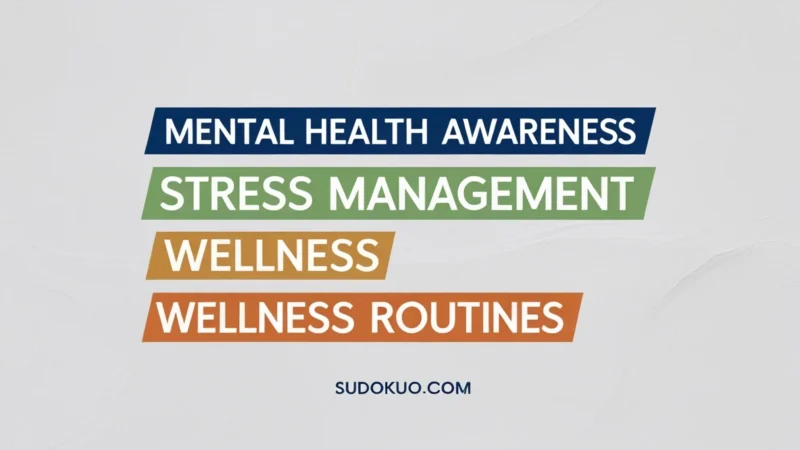Tips for Better Sleep and Recovery

🛌 Introduction: Why Sleep is REALLY the Secret Weapon You’ve Dismissed
Do you wake up tired, groggy, or feeling the fatigue despite 8 hours in bed? 😴 You’re not on your own.
In our hyper-connected, hectic world, sleep and recovery quality is frequently sacrificed — but here’s the truth: sleep is not an extravagance — it’s a need. Sleep fuels our brain, repairs our muscles, balances hormones, and improves one’s energy and mood.
Whether you are an athlete, working professional, or student, stronger recovery and sleep can drastically alter your life, everyday.
🧠 Why Sleep is Important for Recovery
Sleep is one time when your body is in its most essential recovery mode:
- ✅ Muscle repair and growth
- ✅ Immune system support
- ✅ Memory consolidation and cleaning up the brain
- ✅ Balancing hormones and metabolism issues
Not getting enough sleep isn’t just a factor of how tired you are; impaired healing, poor mood, immune system vulnerability are all components of not sleeping properly.
That is precisely why you need to pay attention to sleep hygiene recommendations to obtain optimal health.
🛏️ Top Tips for Improving Sleep Quality
Here are research-based tips for deeper and more restorative sleep that are easy to adopt:
- 🕒 Have a consistent sleep/wake time, even on weekends, if practical
- 🌙 Make your bedroom a sleep sanctuary — dark, cool, and quiet
- 📵 Avoid screens for an hour before bedtime
- 🚿 Take a warm shower to relax muscles and body
- 💨 Calm the mind with deep breathing or meditation
🗂️ Sleep Tips Table
| Tip | Description |
|---|---|
| Put a Sleep Schedule in Place | Go to bed and wake up at the same time, every day |
| Avoid Blue Light | Turn screens off an hour before sleep |
| Stay Cool | Put your room temperature at 65-68°F |
| Limit Caffeine | Avoid coffee or tea 6 hours before bed |
| Wind Down | Develop a calming pre-sleep process |
🧼 Sleep Hygiene Practices
Sleep hygiene does not just mean “clean sheets” — rather it is about putting healthy patterns into place that promote restorative sleep.
🟢 Do This:
- Get to bed in the dark 🌑
- Sleep on a good mattress and have a supportive pillow
- Nap for no longer than 20–30 minutes
🔴 Don’t Do This:
- Use your bed for work and screen time
- Eat a lot of food before sleep
- Sleep with your lights and/or TV on
These little steps can make a big impact on the quality of your sleep and help your body recharge!
🕒 Evening Routines to Enhance Sleep
Following a routine before sleep signals to your body and mind to adjust to an energetic state.
🛁 Sample Evening Routine:
- 8:30 PM – Eat a light dinner 🍲
- 9:00 PM – Move your body gently with stretching or yoga
- 9:30 PM – Read a physical book or journal 📖
- 10:00 PM – Lights out 🛌
🔁 Repeat this sequence week after week and watch your rest and recovery routine improve.
🍵 Foods and Drinks That Promote or Impair Sleep
How you eat and drink before you sleep can certainly influence how you do or do not sleep.
✅ Sleep-Friendly Options:
- 🍌 Bananas (with magnesium)
- 🥛 Warm milk or herbal teas (chamomile, valerian root)
- 🍒 Tart cherry juice (melatonin naturally)
❌ What Not To Do:
- ☕ Have coffee or energy drinks after 2 PM
- 🍫 Have dark chocolate
- 🍕 Eat spicy or greasy meals close to bed
Nutrition is one of the most neglected rest and recovery tips in this helpful list.
📱 Tech and Sleep: What to Avoid Before Bed
Technology can help us through the day but not at night. Deep sleep prevents technology from stealing sleep.
❌ Do not scroll through social media in bed
❌ Do not binge watch Netflix past 10 PM
❌ Do not sleep on your phone next to your pillow
🔒 Pro Tip: Turn on “Do Not Disturb” mode, dim your screen, or use Night Mode during the evening.
⚙️ BONUS: Recovery Tips for Athletes and Active Lifestyles
Athletes and active lifestyles require smart recovery, not just sleep.
🛠️ Recovery Tips:
- 🧊 Ice baths or contrast showers
- 🔄 Active recovery: walking, yoga, or light stretching
- ⏱️ 7–9 hours of quality sleep, sometimes more for high-intensity training
🏋️ Muscle recovery is super-charged when combined with proper rest, hydration and sleep hygiene.
❓ Sleep and Recovery FAQ
Q1: How many hours of sleep do I need?
🕒 Generally, most adults require 7–9 hours of sleep per night. Athletes and teenagers may need 10 to fully recover from physical activity.
Q2: Does exercise help with sleep?
💪 Yes! Regular physical activity can increase the time physically spent in deep sleep. It is recommended to avoid vigorous physical activity in the last 1–2 hours before going to bed.
Q3: Is it bad to nap during the day?
😴 No! A 20-minute power nap can increase alertness. However, napping late in the day is not recommended if nighttime sleep is a problem.
Q4: What is the best sleeping position for recovery?
🛌 There are two sleeping positions everyone can take advantage of for recovery:
Sleeping on your back and/or side with a pillow in-between your knees can relieve soreness and support spinal alignment.
Q5: Can supplements aid with sleep?
🌿 Yes, natural supplements such as melatonin, magnesium, and/or valerian root can aid sleep. However, please consult your medical doctor before taking any supplements.
🧾 Conclusion
While improved sleep and recovery will not happen overnight, using proper sleep hygiene, routines, and lifestyle changes your body and mind will be giving you thanks in a timely manner. 🌙✨
✅ Start with small changes today and you will be making a big difference tomorrow!
Sudoku is a brain-challenging game that promotes mental clarity and focus. It helps enhance logical reasoning, boost short-term memory, and improve attention to detail. As players fill in the grid, they practice thinking ahead and solving problems efficiently. The process encourages a calm, focused state, making it a great stress-relieving activity. Sudoku also builds persistence and discipline, rewarding players with a sense of satisfaction upon completion. It’s a screen-free way to stay mentally active, suitable for any age. Playing regularly can support sharp thinking, quick decision-making, and long-term cognitive strength.






